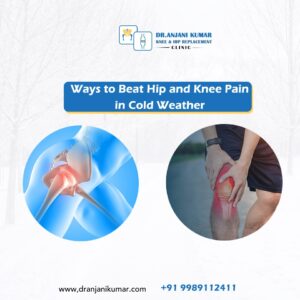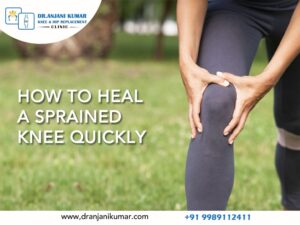People have been living robotic lives due to their professionally hectic schedules. Our hectic lifestyle causes health concerns ranging from minor to serious. The problems could get worse if they are ignored.
Causes of hip pain:
Hip pain is a frequent issue among people of all ages and can have a variety of causes.
The following are a few of the most typical causes of hip pain:
Osteoarthritis: Osteoarthritis is a degenerative joint condition that develops as the cartilage protecting the hip joint ages and deteriorates, leading to discomfort, stiffness, and inflammation.
Bursitis: The bursae are tiny sacs filled with fluid that serve as spacers between muscles, tendons, and bones. Hip discomfort can occur when the bursae inflame, frequently due to repetitive motions or sustained pressure on the hip.
Tendonitis: Muscles and bones are connected by thick cords called tendons. The tendons surrounding the hip joint can become inflamed and irritated by overuse or repetitive motions, resulting in tendinitis and consequent pain.
Hip fractures: Trauma, such as a fall or direct impact, can result in hip joint fractures. In older adults, osteoporosis-related bone weakness may potentially contribute to fractures.
Sciatica: The sciatic nerve travels from the lower back through the buttocks and legs and can become irritated or compressed. Sciatic nerve damage can bring hip pain that extends down the back of the leg.
Herniated disc: A herniated disc is a spinal disc in which the inner, softer section pushes through the outer, harder layer. In the lower back (lumbar spine), a herniated disc may compress or irritate nearby nerves, resulting in hip pain that travels down the leg.
Piriformis syndrome: In the buttock region, there is a piriformis muscle. This muscle has the potential to contract or spasm, compressing the sciatic nerve and resulting in hip pain that travels down the back of the leg.
Spinal stenosis: The narrowing of the spinal canal, known as spinal stenosis, can place pressure on the lower back’s nerves. It may result in hip pain that travels down the leg and usually worsens when you walk or stand still for a long time.
Muscle or ligament strain: Straining or straining the muscles or ligaments around the hip joint may result in discomfort. A lack of proper warm-up before exercising, abrupt movements, or overuse may cause.
Hip impingement: Hip impingement, sometimes referred to as femoroacetabular impingement (FAI), is a disorder in which the femur’s ball-shaped head makes inappropriate contact with the hip joint’s socket. It may result in hip pain extending down the thigh’s front.

Nerve entrapment: Hip discomfort radiating down the leg along the damaged nerve’s distribution can be brought on by nerve entrapment, affecting the obturator nerve or the lateral femoral cutaneous nerve.
Hip labral tear: The hip labrum is a cartilage ring that encircles the hip joint’s socket. Injury, anatomical problems, or repetitive motions can cause labrum tears, resulting in hip pain and discomfort.
Tumours or infections: Even though they are less frequent, tumours or infections in the hip joint might hurt. Medical intervention may be necessary to diagnose and treat these disorders correctly.
These are only a few ailments that might result in hip discomfort that travels down the leg. Speaking with a healthcare professional for a thorough assessment is crucial since they can evaluate your symptoms, order necessary diagnostic tests, and make the best therapy suggestions. It’s important to remember that these are just a few examples and that there may be other causes of hip pain. If you have severe or ongoing hip pain, speak with your doctor to determine the best course of treatment.

Symptoms of hip pain:
Depending on the exact hip ailment or problem, the initial symptoms can change. Nevertheless, the following frequent early symptoms and warning signs may suggest a hip problem:
Hip pain: The most obvious and frequent early indication of hip issues is hip pain. The groyne, thigh, buttocks, or knee may also experience pain in addition to the hip joint. It can feel dull or achy or acute, or stabbing.
Stiffness and restricted range of motion: Difficulty or discomfort when moving the hip joint, including less flexibility and range of motion, might be a precursor to hip issues. You might feel stiff, particularly after periods of inactivity or when you first wake up.
Hip joint popping or clicking: Some people with hip issues may experience popping, clicking, or a catching sensation in the hip joint while moving. It may be brought on by problems with the hip joint’s smooth operation or structural abnormalities.
Discomfort during weight-bearing activities: If you have hip pain or discomfort when performing weight-bearing activities, such as walking, running, or climbing stairs, this may be a sign of a hip problem. Increased activity or extended periods of standing could make the pain worse.
Limited mobility and difficulty performing daily tasks: As hip issues worsen, you could find it difficult to carry out routine tasks like putting on shoes, getting in and out of a car, or sitting longer. Early indications of hip issues may include decreased mobility and trouble performing certain exercises.
Swelling and tenderness: Many hip diseases can lead to inflammation and swelling around the hip joint. When you press on the hip area, you can have bruising or swelling.
Remembering these symptoms could point to hip problems, such as osteoarthritis, hip impingement, bursitis, tendinitis, or other disorders. See a doctor for a full evaluation and diagnosis if you encounter any early indications of hip issues or chronic hip pain. Following your unique condition, they can perform a physical examination, request diagnostic tests as needed, and make suitable treatment recommendations.
Who suffers from Hip Pain?
People of all ages can experience hip discomfort, but specific circumstances may make it more likely.
The following demographic groups more often feel hip discomfort:
Older adults: Hip discomfort is more likely to occur as people age. Older people are more likely to suffer from osteoarthritis, hip fractures, and age-related degenerative changes.
Athletes and physically active people: People who partake in activities like long-distance running, soccer, or ballet are at an increased risk of experiencing hip pain. These activities place repetitive stress on the hip joint. Intense or repetitive athletic training can result in overuse problems, hip impingement, and tendonitis.
People who work in particular occupations: People who work in jobs that require a lot of standing, heavy lifting, repetitive motions, or frequent hip flexion (such as factory employees, healthcare professionals, and construction workers) may experience hip pain due to strain and overuse.
Women: Hip problems such as hip dysplasia and impingement are more frequently seen in female patients. In addition, women’s hip discomfort may be exacerbated by hormonal changes during pregnancy and menopause.
Individuals with a family history of hip problems: Those who have a family history of hip issues: Some hip disorders, such as hip osteoarthritis, may have a genetic component. The possibility of experiencing hip discomfort may be increased if there is a family history of hip problems.
People with specific medical conditions: Hip discomfort and hip joint issues can be made more likely by some medical disorders, including rheumatoid arthritis, lupus, ankylosing spondylitis, and avascular necrosis.
Even while hip pain may be more common in these demographics, anyone can get hip discomfort for various reasons. A healthcare provider should be consulted if you suffer from hip discomfort to receive an accurate diagnosis and the best course of action.
About Dr Anjani Kumar
As an orthopaedic surgeon in Hyderabad, I try to provide patients with as many options as possible for hip and knee treatments to help each patient have the greatest results. I carefully consider the specific sorts of injuries and need to be comfortable offering a specialised solution before recommending the best course of therapy for each patient. My patients’ enhanced mobility and pain reduction are always my top priorities, as these will enable them to resume an active lifestyle. In more severe cases, especially when the joint has collapsed, or the bone has suffered extensive deformation, knee replacement surgery may be advised.
Knee replacement surgery may be recommended in advanced cases, especially if the joint has collapsed or the bone has become severely deformed.
Dr Anjani Kumar has 20 years of experience and successfully performed 2000 knee replacement surgeries, 350 hip replacement surgeries, and 500 pelvic acetabular surgeries throughout his career. Please get in touch with us on Mobile: at +91 9989112411 and by E-mail: anjanikumar@ gmail.com




